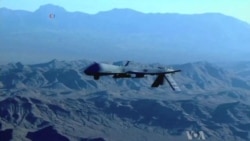WASHINGTON —
The Obama administration is debating whether to approve a deadly drone strike on an American in Pakistan. A White House official is reported to have identified the man as being involved in producing explosive devices that have killed U.S. troops in Afghanistan.
This is the first time the U.S. government is discussing killing an American citizen overseas since President Obama imposed new restrictions on drone operations last May.
“America does not take strikes when we have the ability to capture individual terrorists. Our preference is always to detain, interrogate and prosecute," he said. "America cannot take strikes wherever we choose. Our actions are bound by consultations with partners and respect for state sovereignty.”
The mountains of northwestern Pakistan are the home of the potential target, a man known as Abdullah al-Shami, according to a senior administration official cited in Friday's New York Times. The official says he is involved in producing and distributing improvised explosive devices used against U.S. forces in Afghanistan.
The U.S. has been carrying out lethal strikes on suspected terrorists for about a decade. The number of targeted killings has surged since Obama took office, although the number of drone strikes in Pakistan has dropped dramatically in the past two years.
The White House acknowledged last year that four U.S. citizens have been killed in drone strikes since Obama took office in 2009.
The first was radical Muslim cleric Anwar al-Awlaki, who was killed by a CIA drone in Yemen in September, 2011. The strike also killed three other people. The administration has said Awlaki was the only one who was intentionally targeted,
Obama has called for the U.S. military, not the CIA, to launch the strikes. However, Pakistan does not allow open American military operations in its territory.
Christine Fair, an assistant professor at the Georgetown University School of Foreign Service, says the Pakistani intelligence agency ISI wants its cooperation with the U.S. drone program kept quiet.
“They benefit from this program," she said. "They want to obfuscate the degree to which they have been complicit. They’re complicit in every possible way, providing targeting information. The Pakistanis have to de-conflict the airspace for drones to operate.”
At the same time, Amnesty International USA’s Naureen Shah says the U.S. program needs more transparency.
“Instead of engaging officially with the public and with Congress about what’s going on, the administration has chosen to leak this information," said Shah. "And that underscores the blanket secrecy that has been part of the problem from day one in the U.S. targeted killings program.”
Under the president's restrictions, before an American can be targeted, the Justice Department must show the person is plotting to kill other Americans. The Pentagon must also determine that he cannot be captured alive. And the military must ensure that the strike would not harm civilians.
This is the first time the U.S. government is discussing killing an American citizen overseas since President Obama imposed new restrictions on drone operations last May.
“America does not take strikes when we have the ability to capture individual terrorists. Our preference is always to detain, interrogate and prosecute," he said. "America cannot take strikes wherever we choose. Our actions are bound by consultations with partners and respect for state sovereignty.”
The mountains of northwestern Pakistan are the home of the potential target, a man known as Abdullah al-Shami, according to a senior administration official cited in Friday's New York Times. The official says he is involved in producing and distributing improvised explosive devices used against U.S. forces in Afghanistan.
The U.S. has been carrying out lethal strikes on suspected terrorists for about a decade. The number of targeted killings has surged since Obama took office, although the number of drone strikes in Pakistan has dropped dramatically in the past two years.
The White House acknowledged last year that four U.S. citizens have been killed in drone strikes since Obama took office in 2009.
The first was radical Muslim cleric Anwar al-Awlaki, who was killed by a CIA drone in Yemen in September, 2011. The strike also killed three other people. The administration has said Awlaki was the only one who was intentionally targeted,
Obama has called for the U.S. military, not the CIA, to launch the strikes. However, Pakistan does not allow open American military operations in its territory.
Christine Fair, an assistant professor at the Georgetown University School of Foreign Service, says the Pakistani intelligence agency ISI wants its cooperation with the U.S. drone program kept quiet.
“They benefit from this program," she said. "They want to obfuscate the degree to which they have been complicit. They’re complicit in every possible way, providing targeting information. The Pakistanis have to de-conflict the airspace for drones to operate.”
At the same time, Amnesty International USA’s Naureen Shah says the U.S. program needs more transparency.
“Instead of engaging officially with the public and with Congress about what’s going on, the administration has chosen to leak this information," said Shah. "And that underscores the blanket secrecy that has been part of the problem from day one in the U.S. targeted killings program.”
Under the president's restrictions, before an American can be targeted, the Justice Department must show the person is plotting to kill other Americans. The Pentagon must also determine that he cannot be captured alive. And the military must ensure that the strike would not harm civilians.





